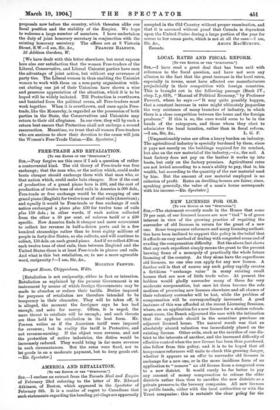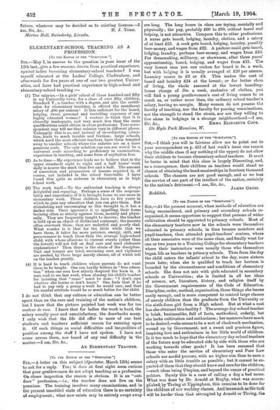NEW LICENSES FOR OLD. [To TIM EDITOR OP TIM "
SPECTATOR:]
STD,—The statement recently made in the House that some 70 per cent. of our licensed houses are now " tied " is of grave
interest in view of the growing practice of requiring the surrender of old licenses in return for the grant of a new one. Some temperance reformers and many licensing authori- ties have been inclined to support this policy in the belief that it affords an easy method of dealing with congested areas and of evading the compensation difficulty. But the above fact shows that any such expedient simply means the grant to the present brewing firms of a monopoly of practically the whole future licensing of the country. As they alone have the superfluous old licenses, no one else can apply for any new license. A further evil is that of course any such policy rapidly creates a fictitious "exchange value" in many existing small houses that are now of little trade value. At present the holders would gladly surrender many of these for very moderate compensation, but once let them become the sole medium of procuring new licenses elsewhere and all chance of their voluntary surrender will be lost, while the problem of compensation will be correspondingly increased. A good instance of this was afforded at the recent Licensing Sessions, where, on an application for anew license for a station refresh- ment-room, the Bench adjourned the case with the intimation that the applicant should in the meantime purchase an adjacent licensed house. The natural result was that an absolutely absurd valuation was immediately placed on the existing license. Other evils, such as the sacrifice of one dis- trict to the interests of another, and the increased difficulty of effective control when the new license has been thus purchased, also follow from this policy, and it is to be hoped that all temperance reformers will unite to check this growing danger, whether it appears as an offer to surrender old licenses in exchange for a new one, or in the more insidious form of an application to " remove " an old license from a congested area to a new district. It would surely be far better to pay any amount of money compensation to release the older districts rather than thus to sacrifice the new districts as a private preserve to the brewery companies. All new licenses in public hands, either with the local authorities or with the Trust companies; this is certainly the clear policy for the











































 Previous page
Previous page